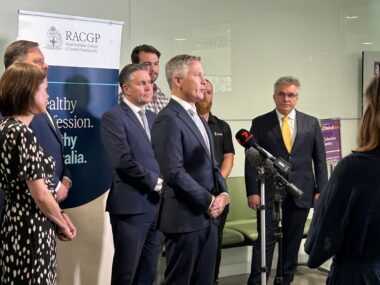Seaport Therapeutics, a clinical-stage biopharmaceutical company based around a unique drug delivery platform originally developed by Monash University researchers, has announced the closing of a US$100 million oversubscribed Series A financing round. The round was co-led by ARCH Venture Partners and Sofinnova Investments along with Third Rock Ventures and Seaport founder PureTech Health.
Using the proprietary GlyphTM platform – which was initially developed by Professor Christopher Porter and his team at the Monash Institute of Pharmaceutical Sciences (MIPS) – Seaport Therapeutics is advancing a clinical stage pipeline of neuropsychiatric medicines in areas of high unmet patient needs including depression and anxiety disorders – currently being held back by key limitations such as negligible oral bioavailability or hepatotoxicity. The Glyph platform solves these limitations by rerouting the mechanism of absorption to enable oral administration and reduce liver exposure.
Professor Porter and the MIPS team have worked closely with Seaport’s founder PureTech since 2017 to help progress the platform and advance development candidates including SPT-300 (formerly known as LYT-300), an oral form of the drug allopregnanolone. Jamie Simpson, Ph.D., a former MIPS group leader and collaborator with the Porter Research Group at Monash University and an original co-inventor of the Glyph Technology, is now Head of Chemistry at Seaport Therapeutics
“It has been rewarding to see the Glyph technology being used to attempt to unlock the full potential of neuropsychiatric medicines and make much-needed treatments easier, more effective and more accessible for those living with a broad range of neurological conditions,” said Professor Porter.
Seaport Therapeutics is built on a proven development strategy and is led by the team that created and advanced the groundbreaking drug candidate KarXT (xanomeline-trospium), which is now poised to be the first new class of medicine in over 50 years for patients living with schizophrenia. This new financing will support the rapid advancement of Seaport Therapeutics’ clinical-stage pipeline of first and best-in-class medicines as well as further development of the Glyph platform, which has demonstrated clinical proof-of-concept.
“We are dedicated to bringing first and best-in-class medicines to those that are suffering from depression, anxiety and other neuropsychiatric disorders,” said Daphne Zohar, Founder and CEO of Seaport Therapeutics. “I’m excited to deliver on this mission along with a stellar team of senior leaders and investors.”
"Major depression and anxiety disorders are among the most common, disabling and potentially fatal of all medical conditions. Seaport’s pipeline of investigational antidepressants and anxiolytics are well positioned to more effectively treat these disorders,” said Steven M. Paul M.D., Founder and Chair of the Board of Directors of Seaport.
“This announcement demonstrates global recognition of the transformative impact of Monash University’s research,” said Professor Doron Ben-Meir, Deputy Vice Chancellor (Enterprise and Engagement) and Senior Vice-President.
“By licensing our world-leading invention, we’ve been able to create the foundation to help millions of people and their families.”
In addition to Professor Porter, the team at Monash that developed the Glyph technology was led by Associate Professor Natalie Trevaskis and Dr Sifei Han and included Dr Luojuan Hu, Dr Dan Zheng, Dr Nathania Leong, Dr Garima Sharma, Dr Xiaotong Zhou, Dr Enyuan Cao and Dr Mitchell McInerney.
Contact details:
Kate Carthew

